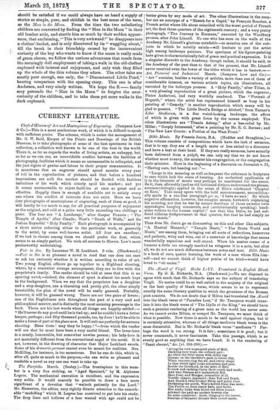Fair to See. By Laurence W. M. Lockhart. 3 vole.
(Blackwood.) —Fair to See is so pleasant a novel to read that one does not care to ask too curiously whether it is written according to rules of art. Two young English officers go up together to a Highland shooting, where, by a somewhat strange arrangement, they are to live with the proprietor's family. The reader should he told at once that this is no sporting novel,—indeed, the element of sport is almost too much kept in the background. When we say that the proprietor has a daughter and a step-daughter, one a charming and pretty girl, the other simply irresistible, the plan of the novel will be easily guessed. Probably, however, it will be guessed wrong. There are not two pairs of lovers ; one of the Englishmen acts throughout the part of a very cool and philosophical mentor, and is distinctly the most amusing personage in the book. These are his last words when all things are happily settled :— " He'll never do any good until he is tied up; and he couldn't have a better keeper, perhaps ; and fifty thousand pounds, too, by Jove ! he'll be able to make a forest of part of the place now. It will suit me perfectly for autumn shooting. Bless them ! may they be happy I "—from which the reader will see that he must have been a very useful friend. The lover-hero is a manly, honourable, but somewhat unwise person ; his lady-love is not materially different from the conventional angel of the novel. It is not, however, in the drawing of character that Major Lockhart excels. Some of his dramatis personce cannot even be meant for realities. Mrs. McKillop, for instance, is too monstrous. But he can do this, which is, after all, quite as much to the purpose,—he can write as pleasant and readable a novel as any one can want to take up.


































 Previous page
Previous page